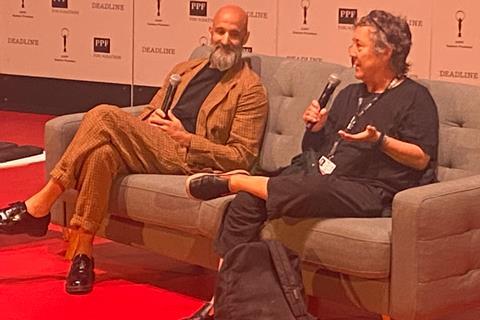
Mubi’s chief content officer Jason Ropell has talked up the company’s growth ambitions, saying it wants to scale up to meet growing global demand for auteur and independent films in both theatres and on its streaming platform.
“We need to be global,” said Ropell, speaking on a panel at the Karlovy Vary International Film Festival today (July 2). “We need to have global theatrical distribution capabilities on top of the global streaming ability which we have. I think over time you’ll see us moving in that direction. I feel very, very strongly that the global aggregate audience for our type of film is actually quite large, and the room for growth is high.”
Asked to describe Mubi, Ropell pitched it as an “evolved” and “modern” studio that is “meant to aggregate the demand globally for all independent film.”
Mubi, he said, “has all the components of a modern studio from development through production, distribution, theatrical distribution, through to a platform which we own, and sales thereafter, as well as foreign sales through The Match Factory.”
“We like to be able to have multiple ways of saying yes to being involved in a project that that we’re interested in. That’s kind of how to think about what Mubi is.”
Mubi acquired The Match Factory in 2022. Just this week, Mubi announced it is co-financing French director Mia Hansen-Løve’s next film If Love Should Die, with The Match Factory handling sales. Last week, Mubi snapped up key territories for Portuguese filmmaker Miguel Gomes’ Cannes competition film which is sold by The Match Factory.
Ropell said that Mubi “cared deeply” about theatrical audiences, and that in most cases the right way to get audiences for a film was through cinemas and then on the Mubi platform. ”We have a lot of information, both anecdotal and otherwise, that shows that young people really, really care about film and love seeing films in theatres.”
Room to grow
As the major streamers have started to retreat from the independent space it has left room for Mubi to grow, said Ropell.
“The business is changing, and a lot of larger players that have made investment in the auteur space have abandoned it for the time being. That open space is wide open for us. We haven’t targeted it - that’s not been part of the strategy. It’s like the business has come to us - and that open space has opened up in front of us.”
This, he said, is despite the appetite globally foreign- language films increasing “very, very significantly” to the point that Mubi is now territory and language agnostic.
“We don’t really even make a distinction between films that are coming from any particular territory,” he said. “The best films are the films we’re interested in, no matter where they’re coming from. Our goal is to try to find them a global audience.”
Ropell was speaking on a panel alongside Killer Films’ Christine Vachon who, asked for her advice for Czech filmmakers, emphasised the importance of thinking about the audience.
She said US producers were more in the habit of this as they did not have the European subsidy system to rely on.“We have to think a lot more about our audience and who we’re actually making our movies for…I actually do feel that that makes for a stronger cinema. I have spoken at institutions all over Europe, all over the world, and am always a little surprised at filmmakers who don’t think that the audience matters. We are compelled to really interrogate who’s going to see a film and who are we making it for. That forces us into a discussion that I think ultimately disciplines the films in a good way.”
Her point was echoed by Ropell. “Any kind of recognition of what we will go through from a studio or distributors perspective trying to find the audience for the film…any kind of forethought, thinking, or recognition that this is part of the overall process, is so, so valuable.”

























No comments yet